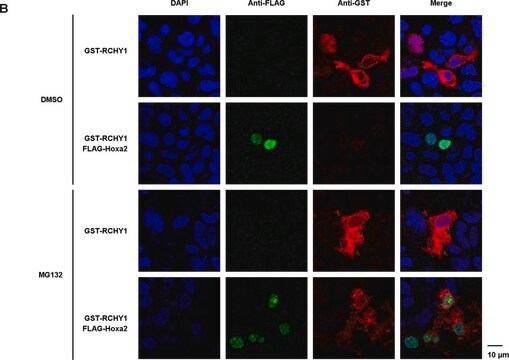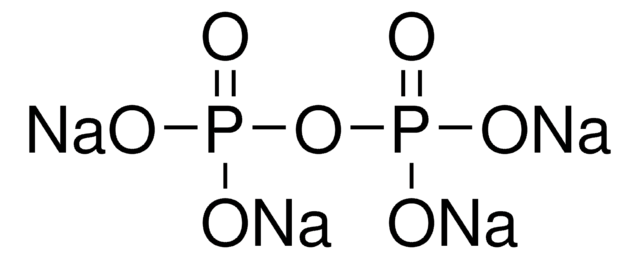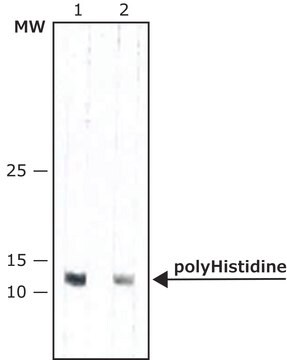GERPN1236
Anti-GST HRP Conjugate
Cytiva RPN1236, pack of 75 μL
Sign Into View Organizational & Contract Pricing
All Photos(1)
About This Item
UNSPSC Code:
12352203
NACRES:
NA.46
Recommended Products
conjugate
peroxidase conjugate
antibody product type
primary antibodies
packaging
pack of 75 μL
manufacturer/tradename
Cytiva RPN1236
color
Colorless
shipped in
dry ice
storage temp.
−20°C
General description
Anti-GST HRP Conjugate.
Application
GST is a commonly used expression marker in cloning that is also used for purification and detection of fusion Proteins. This highly specific antibody to GST is conjugated to horseradish peroxidase and optimized for use in Western blotting with ECL™ Detection Reagents.
GST is a commonly used expression marker in cloning that is also used for purification and detection of fusion Proteins. This highly specific antibody to GST is conjugated to horseradish peroxidase and optimized for use in Western blotting with ECL™ Detection Reagents.
Features and Benefits
- Offers the advantages of speed, sensitivity, increased safety, and convenience when used with ECL™ detection systems. Application tested with ECL™ and ECL™ Plus reagents in western blotting for sensitive hard copy results
- Detection of GST is simplified because no secondary antibody is required
- The conjugate recognizes multiple epitopes of GST and therefore is not reliant on functional GST for fusion Protein detection. It has also been cross-absorbed to E. coli Proteins so that GST-fusion Proteins can be easily and specifically identified against an E. coli background.
- Binds with high affinity to GST fusion Proteins.
- Also suitable for colorimetric detection with diaminobenzidine (DAB) and tetramethylbenzidine (TMB).
- ECL™ optimized protocols included.
Storage and Stability
Please be aware this product may be shipped 90 days before the expiration date. For more information on the batch specific expiration date, please contact technical service.
Store at 4 to 30 °C ()
Analysis Note
To view the Certificate of Analysis for this product, please visit www.cytiva.com.
Legal Information
GST Gene Fusion Vectors
A license for commercial use of GST Gene Fusion Vectors under US patent 5,654,176 and equivalent patents and patent applications in other countries must be obtained from Millipore Corp (formerly Chemicon International Inc).
A license for commercial use of GST Gene Fusion Vectors under US patent 5,654,176 and equivalent patents and patent applications in other countries must be obtained from Millipore Corp (formerly Chemicon International Inc).
ECL is a trademark of Cytiva
Not finding the right product?
Try our Product Selector Tool.
Storage Class Code
12 - Non Combustible Liquids
Certificates of Analysis (COA)
Search for Certificates of Analysis (COA) by entering the products Lot/Batch Number. Lot and Batch Numbers can be found on a product’s label following the words ‘Lot’ or ‘Batch’.
Already Own This Product?
Find documentation for the products that you have recently purchased in the Document Library.
Asparagine endopeptidase cleaves α-synuclein and mediates pathologic activities in Parkinson's disease.
Zhang Z, et al.
Nature Structural and Molecular Biology, 24(8), 632-632 (2017)
Hannes Vanhaeren et al.
eLife, 9 (2020-03-27)
Protein ubiquitination is a very diverse post-translational modification leading to protein degradation or delocalization, or altering protein activity. In Arabidopsis thaliana, two E3 ligases, BIG BROTHER (BB) and DA2, activate the latent peptidases DA1, DAR1 and DAR2 by mono-ubiquitination at
Amra Saric et al.
Nature communications, 12(1), 4552-4552 (2021-07-29)
The ability of endolysosomal organelles to move within the cytoplasm is essential for the performance of their functions. Long-range movement involves coupling of the endolysosomes to motor proteins that carry them along microtubule tracks. This movement is influenced by interactions
Zhentao Zhang et al.
Nature communications, 8, 14740-14740 (2017-03-28)
δ-secretase, also known as asparagine endopeptidase (AEP) or legumain, is a lysosomal cysteine protease that cleaves both amyloid precursor protein (APP) and tau, mediating the amyloid-β and tau pathology in Alzheimer's disease (AD). Here we report the therapeutic effect of
Articles
This page describes troubleshooting strategies in the detection of GST-tagged proteins.
Our team of scientists has experience in all areas of research including Life Science, Material Science, Chemical Synthesis, Chromatography, Analytical and many others.
Contact Technical Service








